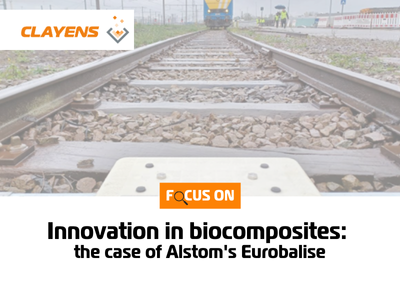Reducing environmental footprint through innovation in biocomposites: the case of Alstom's Eurobalise

Since 2014, CLAYENS has transformed the production of Eurobalise housing, a critical component for railway signaling systems, by using a bio-based material derived from sugar beet waste produced by IDI.
This change was made without compromising mechanical properties and demonstrates a significant step in our commitment to more sustainable and eco-friendly solutions.

Background and challenges
The Eurobalise housing for Alstom, initially manufactured with petro-based thermoset materials, must meet stringent durability and performance standards. Exposed to challenging environmental conditions (rain, snow, frost, UV), this component needs to withstand substantial mechanical and thermal stress and includes anti-slip patterns and specific finishes.
Innovation and collaboration
In collaboration with Alstom and IDI, CLAYENS introduced a biocomposite to replace traditional thermoset materials while meeting complex specifications:
- Weather Resistance: The new material delivers optimal performance even under extreme climatic conditions.
- Mechanical Properties: The biocomposite offers comparable strength and durability to traditional thermoset materials.
- Customization: The part can be customized with various patterns, colors, shapes, and logos.
- Cost Reduction: Leveraging its expertise, CLAYENS optimized the manufacturing process and adjusted tooling, leading to production cost reductions.
- Reduced Carbon Footprint: Replacing petro-based materials with bio-based resin reduces environmental impact. The resin used here is derived from the sugar beet industry’s waste, ensuring no competition with food resources.
Résults
CLAYENS has been producing between 15,000 and 25,000 Eurobalise cases a year since 2014, and with this biosourced material since 2019. This success highlights CLAYENS's ability to support its clients in transitioning to more sustainable materials while maintaining competitive costs and adhering to stringent technical specifications.
Expertise and process mastery
CLAYENS processes over 3,500 unique references across 40 different chemistries, showcasing our extensive expertise in handling diverse materials. Our mastery of the production process and our capacity for innovation have enabled us to offer customized, effective solutions tailored to our clients' specific needs.
Conclusion
The successful transition to bio-based materials to produce Alstom's Eurobalise housing exemplifies CLAYENS's commitment to sustainable innovation.
